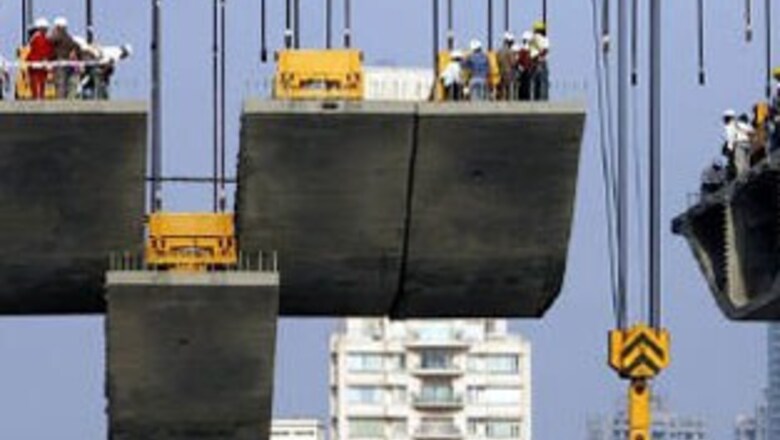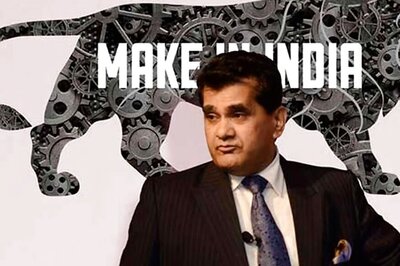
views
Washington: Better news on manufacturing in Europe, China and India, and positive signs on US home sales and construction raised hopes on Monday that the deepest economic slump in decades may have bottomed out.
Manufacturing in Europe declined at its slowest pace in six months, and grew in China and India in April, while pending sales of existing U.S. homes rose unexpectedly in March and US construction spending rose a slim 0.3 per cent the same month, its first increase since September.
A top US Federal Reserve official said the recession is fading and growth will resume later this year. "While overall activity is still contracting, it now appears as if the pace of contraction is diminishing, and at some point later this year, activity will bottom out and begin expanding again," Richmond Federal Reserve President Jeffrey Lacker said in a speech to business leaders. European and US shares rose - Wall Street's leading indexes jumped 2.5 per cent or more as investors bet the government's "stress tests" won't be bad for banks and hoped the housing data meant the recession is ending.
The S&P 500 topped the psychologically important 900 level for the first time since early January. The FTSEurofirst 300 index of top European shares had ended up 1.5 per cent, its highest close since January 12, with oil and gas and industrial engineering among the top sectoral gainers.
Fears of a deadly flu epidemic also eased, cheering investors. Mexico's peso currency soared and its stocks jumped after the government of the country hit worst by the flu said the worst of the illness had passed.
Oil prices rose to their highest close of the year, above $54 a barrel, on hopes an easing of the recession will pave the way for a recover in world energy demand.
MOST WIDESPREAD RECESSION
The latest rays of hope were clouded by a warning from the European Commission that growth rates in the European economy will only turn modestly positive in the second half of 2010.
"The European economy is in the midst of its deepest and most widespread recession in the post-war era," Economic and Monetary Affairs Commissioner Joaquin Almunia said after the Commission revised down its forecasts.
"But the ambitious measures taken by governments and central banks in these exceptional circumstances are expected to put a floor under the fall in economic activity this year and enable a recovery next year," Almunia said in a statement.
The China and India PMI data helped push Asian stocks to seven-month highs, also supported by the positive US data. US stocks were also fueled by investor hopes banks will be able to raise any capital they may need as a result of findings in the government stress tests.
Results of the tests will be made public on Thursday. Bank of America denied a Financial Times report that it planned to raise more than $10 billion even as it and Citigroup attempt to persuade the government they do not need to bolster their balance sheets.
President Barack Obama's administration said it does not see a need to ask the US Congress for more money to support banks. Spokesman Robert Gibbs said there would be banks that will need more capital, but the administration would expect them to raise that on their own.
Obama also vowed to overhaul tax policies he said reward companies for shifting U.S. jobs overseas and allow rich people to evade taxes by using offshore accounts.
A STEP CLOSER
Elsewhere, a reshaping of Europe's car industry moved closer as Fiat sought official German support for a plan to take over General Motors' European operations just four days after clinching a deal with Chrysler. Chrysler asked a US bankruptcy court for a swift hearing on its planned sale to Fiat.
A series of global PMI surveys - which record changes in items such as output, orders, employment, inventories and prices-- suggested the world economy may be past the worst. Markit's Final Eurozone Manufacturing Purchasing Managers' Index of around 3,000 companies rose to 36.8 in April, its highest level since October.
It was, however, the 11th consecutive month below the 50 mark, which divides growth from contraction. "It is still clearly recessionary but it can be said quite safely that the worst is behind us both in terms of industrial decline and of GDP," said Marco Valli at Unicredit.
The US National Association of Realtors said pending sales of previously owned homes rose 3.2 per cent in March, the second straight month with a gain, suggesting a moderation in the housing slump. A Commerce Department report showed construction spending rose 0.3 per cent in March, its first increase in six months.
Hong Kong-based brokerage CLSA's China Purchasing Managers' Index (PMI) rose to 50.1 in April from 44.8 in March, the first time since July 2008 the seasonally-adjusted index climbed above 50. In India, the ABN AMRO Bank purchasing managers' index rose to 53.3 from March's 49.5, its highest in seven months.



















Comments
0 comment